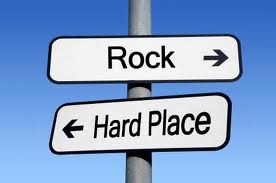Here are some things to consider:
- Are you going back to the passage after you get down to those two answers? If so, are you looking for key transitions/punctuation marks/ explanations, etc. or are you just aimlessly rereading without a clear idea of what you’re looking for?
- Do you ever start/stop reading halfway through a sentence? If so, make sure you back up to the beginning of the sentence or keep reading until the end; otherwise, you’re likely to miss important info.
- Do you confine yourself to the lines you’re given in the question, or do you read a little before/after as well? Or, conversely, do you read too far ahead and lose sight of the what the lines referenced actually say. Function questions often require information in the sentence or two before the line reference; other question types can usually be answered from the lines given.
- Do you consider whether the answer you’re choosing makes logical sense in the real world? (e.g. an answer stating that no scientific advances have recently been made is simply at odds with reality).
- Do you work from the more specific answer and check whether it is directly supported by the passage?
- Does one of the answer choices contain a synonym or synonyms for a key word in the passage? It’s probably right. Correct answer rephrase the passage. If an answer uses words verbatim from the passage, it’s probably wrong.
- Do you ever pick answers that are too extreme, or that are beyond the scope of what can be determined from the passage? (e.g. the passage talks about one painter and the passage refers to painters in general.)
- Pay careful attention to the topic of the passage — the correct answer will often refer to it, either by name or rephrased in a more general fashion (e.g. Frederick Douglass = an individual). Incorrect answers often refer to things that the passage mentions but that are not its main focus.
- Do you try to answer questions in your own words before you look at the answers, or do you rely only on the answer choices? This technique is not about trying to get ETS’s exact wording — it’s about anticipating what sort of information will be present in the correct answer so that you don’t get distracted by plausible-sounding wrong answers.
- If you are answering questions in your own words, keep in mind that you’re looking for the idea you’ve come up with. The actual phrasing might be very, very different from what you’re expecting, and may be written in a form you don’t immediately connect to what you’ve said. Part of what makes the SAT so challenging is the fact that you can’t always anticipate the angle that a correct answer will come from. Some questions can be answered correctly in multiple ways, but the correct answer that appears on the test will not always be the most obvious correct answer.
- Do you read too far into the questions and start to impose an interpretation or make assumptions that the passage does not directly suggest? You need to read literally, not speculate about what the author could be saying.
- Do you avoid choosing answers simply because they’re confusing? Whether an answer makes sense to you has no effect on whether it’s right or wrong.
